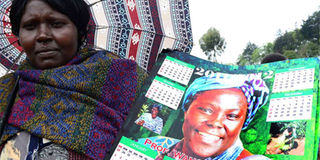Enduring allure of the traditional picture calendar

Jane Nyambura, a trader in Nyeri, sells calendars with a portrait of the late Prof Wangari Maathai on October 14, 2011.
What you need to know:
- The Gregorian calendar (used in most countries) was mostly an item of grandeur.
- For Ndiritu, a retired teacher, these are not mere wall hangings; they are muted soundtracks, diaries.
- Sales departments are aware of how deep the bond runs.
Stacey Mosop knows the one thing she cannot afford to leave when packing her holiday bag in readiness to travel home to Iten in Elgeyo-Marakwet as December approaches.
Her mother mentioned it the last time they spoke. It is a conversation they have every December. “The calendar. Remember to bring me the calendar,” her mother had said told her on the phone. “With all the pages.”
“What she meant is, don’t bring the one-page thing,” Mosop laughs. “It has to be the type with flip-over pages.
For all the digital progress, with the quiet erasure of the more traditional methods (wrist watch, hand-written letter) the picture calendar has managed to hang on, an enduring symbol as much for marking time as a fixture in home and office décor. But mostly décor.
The pages live on, hanging on rusty nails in the sooty walls of country kitchens, as well as in the living rooms of mansions.
Their dismembered pages sit alongside framed pictures; it could be the Pope clutching his staff, a former president, a striking model selling soap; or a plane disappearing into the clouds.
How the physical calendar became a fixation and enduring symbol owes as much to practicality and convenience as to the art of marketing. The Gregorian calendar (used in most countries), was actually not mass-produced like it is now, until the last century, and was mostly an item of grandeur.
HANGING AT HOME
People used is mostly to mark important events – until forward-looking marketing people crept into the pages and soon enough, an airline appeared here, a tub of margarine there and the buying public began looking forward to the images.
“The calendar hanging at home for the most part has little to do with the dates though it has a lot to do with association,” says Elizabeth Muiruri, a marketing specialist and anthropologist. “In most cases, especially with corporate calendars, there is the idea of prestige to be associated with a certain brand, with the imagery.”
And while marketing mechanics and thinning budgets have caused companies to cut back on mass production of calendars-much to the chagrin of their clientele, sales departments are aware of how deep the bond runs.
“Throughout the years we have issued calendars to our customers as part of our end-of-year giveaways,” says a sales representative for a local bank. “But last year we decided to give Christmas cards signed by the managing director instead. From the feedback we got, that idea didn’t go well with many of the customers, especially those in our upcountry branches.”
Joseph Gichungu operates a cyber office in Nyeri town. It’s December 27 and the year is almost ending, just like the ink on his laser printer. “Calendars for local churches,” he says, as the machine spits coloured printouts of calendars bearing smiling faces of church deacons, a picture of the church in the background. “Hardly anyone consults the calendar anymore, but the calendars are good for marketing. You don’t give a brochure, you give a calendar.”
Joseph Ndiritu’s home sits atop a slope in Mahiga, Othaya, offering a sweeping view of rolling tea estates below. There is an eerily museum-like, earthy air to the small timber house, whose living room is better lit. On the walls are calendars dating back to 1987. They feature people wearing Afros, tractors digging up chunks of earths, people preaching, wildlife.
For Ndiritu, a retired teacher, these are not mere wall hangings; they are muted soundtracks, diaries. He flips the one to October 89. On top of the page he has written in correct cursive: Caroline W. N. He traces his finger down the page to date 17. “It’s the month my youngest daughter was born,” he says, a hint of pride and nostalgia in his voice.




